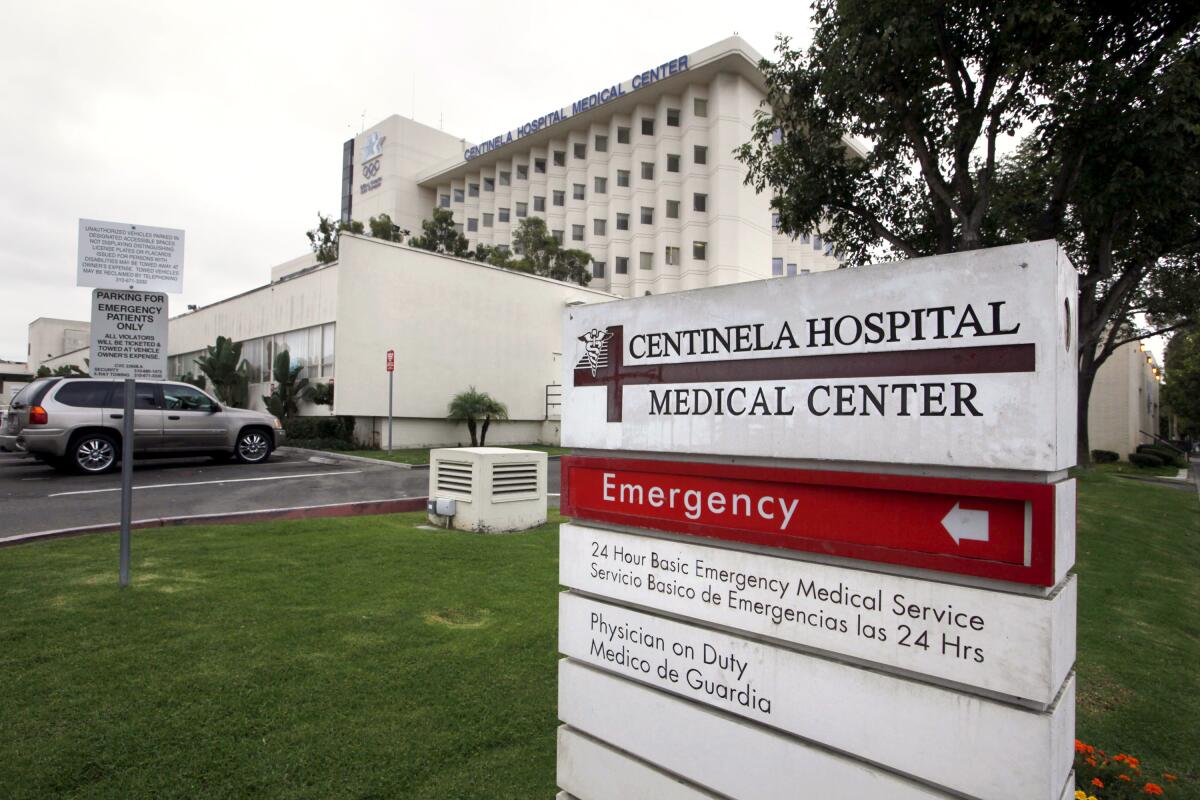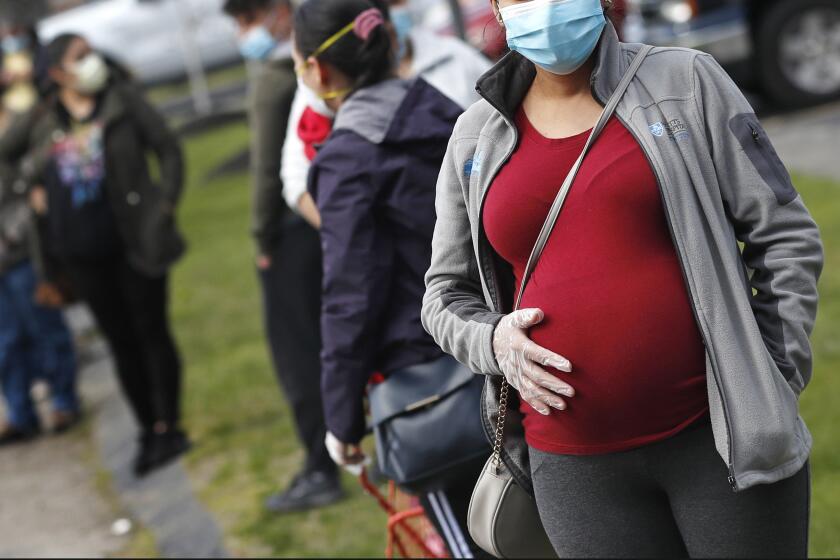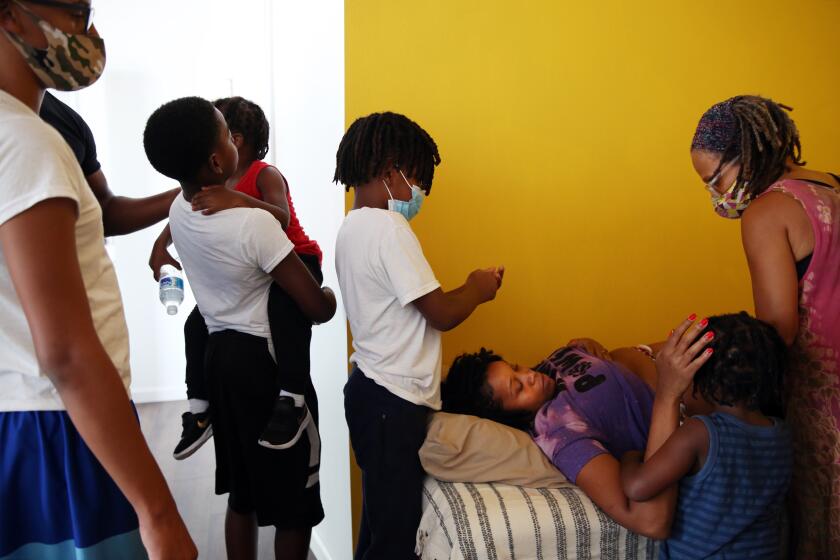State investigators found lapses that could threaten patients at Inglewood hospital

- Share via
An Inglewood hospital violated federal requirements in ways that could jeopardize patients, including by failing to properly assess and treat birthing patients to reduce the risk of blood clots, a state review found.
Centinela Hospital Medical Center repeatedly failed to take steps to prevent patients from suffering potentially deadly clots, which can include using compression devices that improve blood flow in the legs, investigators from the California Department of Public Health found after a February visit.
The state officials were surveying Centinela Hospital to see if it was meeting several conditions for participating in federal programs that reimburse hospitals, an investigation that was undertaken with the approval of the Centers for Medicare and Medicaid Services in response to a complaint.
The findings by the California Department of Public Health followed a public outcry over the death of a Black woman who delivered a baby at the Inglewood hospital. Black women remain at the highest risk of dying of pregnancy complications in California compared with women of other races, despite some progress in reducing the rate of maternal deaths.
Deaths of pregnant women surged by 40% during the pandemic, according to new federal data. California has been a leader in reducing maternal mortality.
The state report does not name April Valentine, the 31-year-old whose death spurred public protests and calls for investigation, but describes shortcomings in care for several patients, including one in labor who became “unresponsive” on Jan. 10, the same day that Valentine died at Centinela Hospital.
You could introduce anyone to Valentine and “you’re immediately her cousin,” said her cousin Mykesha Mack, who was among the family members calling for an investigation after her death. “She was such a gem — just will crack you up and get on your nerves at the same time.” Because she loved celebrating her birthday, the family threw a birthday party for Valentine in her memory.
Valentine left behind a baby daughter named Aniya, whose photos Mack has sent to government investigators to humanize the reality of her growing up without her mother. Last month, Mack texted the phone number that Valentine had once used to wish her a happy first Mother’s Day.
The child is “very much growing and gorgeous as freaking ever,” raised in the care of her father, Nigha Robertson, and surrounded by family, who are finding ways to support each other after their loss, Mack said.
The Los Angeles County coroner has yet to release a cause of death for Valentine.
Centinela Hospital is part of the Prime Healthcare system, whose spokesperson said that “our thoughts and prayers are with the family of Ms. Valentine, as well as the clinicians and staff at the Centinela OB/GYN department, who have struggled and grieved following this incident.”
“Centinela Hospital is deeply committed to continuous quality improvement and has taken numerous steps in response to this incident, including conducting an internal review and fully cooperating with all investigations,” said Elizabeth Nikels, vice president of communications and public relations for Prime Healthcare, in an email.
Nikels added that Centinela “immediately addressed” the findings from the state team that visited in February, and “there were no financial penalties attached.”
Among pregnant women in California, cardiovascular disease was the leading cause of death between 2018 and 2020, followed by hemorrhage, sepsis, thrombotic pulmonary embolism, and amniotic fluid embolism. More than a quarter of the deaths happened on the day of delivery.
Some progress has been made with decreasing the rate of maternal deaths among Black women in California. The most recent state data from between 2018 and 2020 shows there were 45.8. Black maternal deaths per 100,000 live births, down from 58.6 deaths between 2013 and 2015.
However, Black women in California continue to be at the highest risk of dying from pregnancy complications compared to women of other races. Between 2018 and 2020 there were 15 maternal deaths per 100,000 live births among Asian women, 14.8 maternal deaths among Latino women and 12.6 maternal deaths among white women.
At Centinela Hospital, state investigators found that for several patients in the labor and delivery unit, medical records did not show appropriate steps being taken to address the risk of blood clots, which can form in the legs or arms and then make their way to the lungs.
Blood clots in the lungs are one of the most common causes of pregnancy-related death in the U.S., and women are five times more likely to experience a dangerous clot while pregnant, according to the Centers for Disease Control and Prevention.
The team of investigators, who surveyed the Inglewood hospital in February, called it an “immediate jeopardy” situation — one in which failing to meet requirements had or would likely cause serious harm or death. That label was dropped after the hospital submitted a plan to fix the problems, including reeducating nurses on measures to prevent blood clots.
Centinela Hospital was also faulted for nurses failing to tell a doctor when a patient in labor had concerning readings for their own vital signs or that of the fetus, as well as not following up when the patient complained of “leg heaviness.” The violations had “a potential to result in harm due to delayed treatment,” the team concluded.
The California Department of Public Health also found that Centinela Hospital failed to ensure that its nursing staff administered a hormone that induces labor in the way that a physician had ordered, which risked unnecessarily increasing the dosage. And state investigators found other problems during their February visit, including a nurse having to juggle four patients along with duties as a charge nurse, which “had the potential to result in patient needs not being met.”
California was supposed to start paying doulas this year to facilitate healthier pregnancies for Medicaid enrollees. But the benefit has been delayed. Doulas feel lowballed by the state.
In January, grieving friends and family members told the Los Angeles County Board of Supervisors that Valentine had been neglected by hospital staff who refused requests to call her doctor. Nikels said nurses were at her bedside throughout her care, and the labor and delivery unit was “appropriately staffed.”
“There are medical complications that arise during delivery that are unpredictable and can be insurmountable, despite the highest standards of care,” Nikels said.
Mack said the family has heard from agencies including the California Department of Public Health and California Department of Justice that investigations into what happened to Valentine are ongoing. She was hopeful that more news would emerge from those investigations.
The California Department of Public Health said that “while we cannot discuss the details of an active investigation, we are deeply saddened by what happened to April Valentine and her family and can assure all Californians that our public health team is committed to reducing disparities in maternal health outcomes.”
“We have taken, and will continue to take, every action within our legal authority to safeguard patients, investigate licensure violations, and ensure violations are immediately remedied,” the California Department of Public Health said.
Mack said the family is also considering legal action against Centinela Hospital. And to help Black women preparing for childbirth, work is underway to launch a nonprofit in the memory of Valentine, she said, which would provide resources including questions that pregnant people can ask providers, to empower them to speak up if something doesn’t feel right.
“We put too much trust in health providers because we assume, ‘Well, they know better than me,’ but no one knows your body better than you,” Mack said. “We have to learn to listen to our own voice.”
More to Read
Sign up for Essential California
The most important California stories and recommendations in your inbox every morning.
You may occasionally receive promotional content from the Los Angeles Times.














